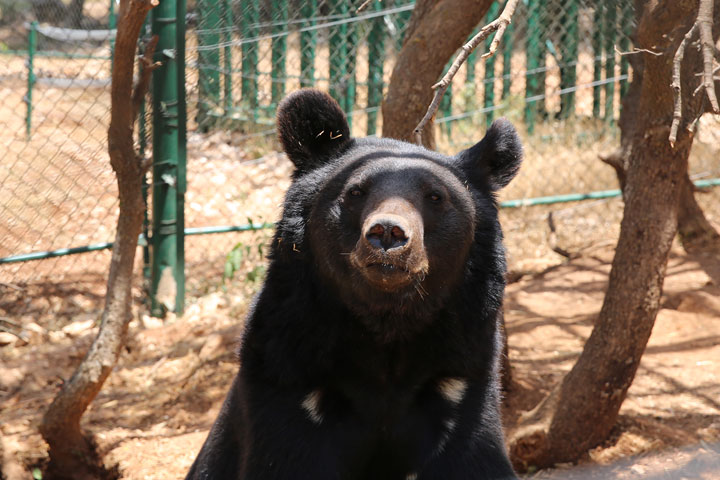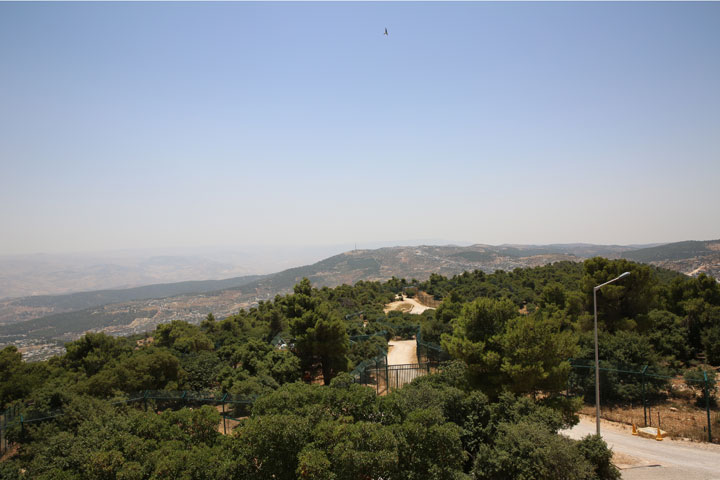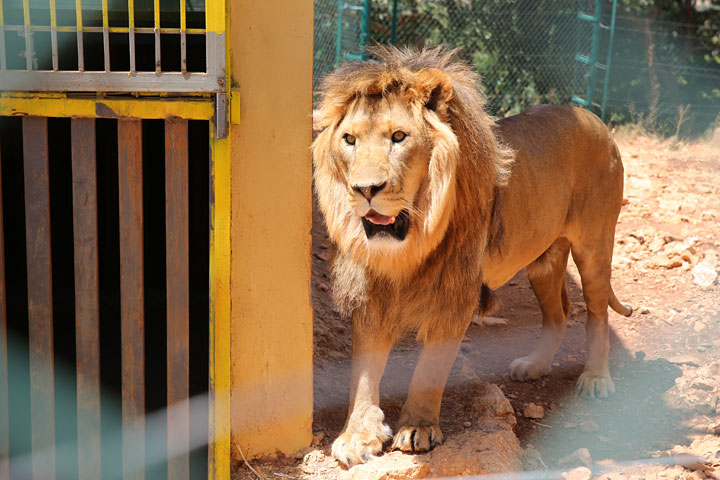Los the bear is afraid of airplanes. Whenever he hears one coming, he runs and hides.

And with good reason. The Asian black bear used to live at the Magic World zoo, just outside of Aleppo, Syria, which saw intense bombing in 2016.
Los and his companion Sukar, meaning “Sugar” in Arabic, were among many animals abandoned at the zoo to face injury, starvation and neglect as a war raged around them. Most died, but Sukar and Los, along with 11 other animals, were rescued from the zoo in 2017 by the group Four Paws International.
They now live in the Al Ma’wa animal sanctuary in northern Jordan, surrounded by trees and far from bombing. The sanctuary holds lions and bears rescued from Aleppo, as well as other lions from Mosul in Iraq, and Gaza. They also have animals, including tigers, that were raised as pets or illegally traded.
“From everyone who works here’s point of view, those animals deserve a better life,” says Mustafa Khriesat, site manager at Al Ma’wa.
“Once you have animals in captivity, you are responsible for them.”
That’s why Four Paws decided to go into a Syrian war zone to save them. While rescuing animals from Mosul, Amir Khalil, a veterinarian who leads Four Paws’ rapid response missions, started to get messages on Facebook, asking them to come to Syria.
It would be “very difficult,” he says, because it was in a rebel-held area. “Everyone is fighting there.”
But after long negotiations as well as permission of the zoo owner who escaped to the U.S., a local security team went in and put the animals on trucks. They then drove the lions, tigers and bears to the Turkish border, where Khalil and a team of veterinarians were waiting.
“It was a huge challenge to be honest,” he says. “But I think we have a very good team and also a good consulting company that assisted us with the logistics on the ground in Syria.”

Get daily National news
The animals were in poor shape, with skin problems, deficiencies from malnutrition and even cardiac and kidney problems — as well as trauma from living in a war zone. “Animals that are caged, to hear the bombs and the planes and the shooting, they don’t know what’s going on,” Khalil says.
WATCH: (From Nov. 2016) Before the war, Aleppo was booming. The city, much like Toronto, was known as the cultural and economic hub of Syria, but the war has reduced the eastern portion of the once-vibrant city to rubble. Global News Anchor Farah Nasser compares the landscape of Toronto to Aleppo.

After receiving some veterinary care, the animals were loaded on a plane and flown to Jordan, where some still remain.
Khalil thinks it was worth the risk. “Animals are not the reason for the war, and humans have the option, even in military conflict, to be evacuated.”
“Why would the animal, trapped in a cage, not have the option to escape from his cage?”
He believes it’s inhumane to leave a hungry animal behind. “We fight for humanity, kindness and a kind person should be kind to both humans and to animals. I cannot divide kindness to be only kind to humans.”
Sanctuary life
At Al Ma’wa, the animals are kept in large outdoor enclosures, with trees, water, platforms, shelters and toys to play with.
“When they came here, all the animals had a lot of wounds, their psychology was very bad, terrible, but when we started to work with them, we had a lot of problems,” says Saif Rwashdeh, animal keeper supervisor.
He’s happy to see the animals have put on weight and seem healthier and more relaxed.
“We work every day with the animals. When we see the animals are very comfortable and very healthy, that means we have done well.”
Although some have moved on to other sanctuaries in South Africa and elsewhere, Al Ma’wa might be the permanent home for many animals. Those born in captivity lack the skills to hunt and survive in the wild, says Khriesat, so they try to provide a good environment for them to spend their lives in.
Building bridges
Khalil and Four Paws plan to continue their work, freeing animals from war zones.
Animals can provide hope and sometimes have the power to build bridges between opposing sides, Khalil says.
“I’ve moved between Hamas and Israel. They don’t like each other. They kill each other and they have conflict,” he says. “But when I take animals from Gaza after the war and move them to Israel, I see Hamas soldiers put their weapons on the ground and they carry the cages of my team.”
“These people don’t agree on anything, have never agreed on anything. And yet they agreed to open the door for animals because animals don’t have passports.”
WATCH: Pregnant lion brought to Turkey from war-torn Syria

People want to help animals when they see them, he says. “People say that about us that we’re crazy, that we don’t take the situation seriously. It’s a war, bombs are falling and you are caring for animals? It sounds funny to them.”
But within hours, those same people ask him if they can donate their breakfast to a bear, or offer a chicken as lion food — even when they have little themselves. “We are proud that we are able to save a life.”





Comments
Want to discuss? Please read our Commenting Policy first.